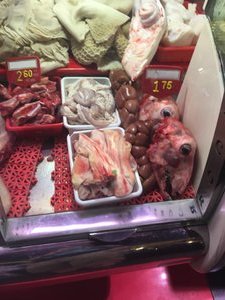Advertisement
Published: June 14th 2019

 Spanish meat vendor
Spanish meat vendor
Many markets in Spain look similar to this where they sell various meats, typically parts of a pig, bull, sheep, rabbits, etc. As this trip is coming to an end, I feel sad to return home as I have had many wonderful experiences here. I have made many great friends I hope to keep as we head back to Messiah, and I feel that I have expanded my cultural knowledge in all areas (CQ drive, CQ action, CQ knowledge, etc) substantially during this trip (Livermore, 2015). I’ve now only experienced one culture other than my own, but I feel that this has made a world of difference for me because I got to see and experience first-hand a culture that has much different values, behaviors, and “norms” than mine that I could never have imagined. For example, learning how important Granada’s specific history and their connection to pomegranates surprised me, and how Toledo’s combined history of Jews, Christians, and Muslims together has lasted through the years in preserved synagogues, churches, and other religious monuments.
Cultural Relations I have now explored several supermarkets, meat markets, and outdoor markets in Spain. In each, I have noticed that much, if not all, of Spain’s meat is laid out, unwrapped, usually behind a glass counter. I have also noticed

 Homeless man's dog
Homeless man's dog
A really friendly dog belonging to a local homeless man in Granadathat the meat vendors are not hesitant to lay out all parts of an animal or an entire carcass. Through a few interactions with Spaniards here as well as intercultural students back home, I’ve learned that this is a common way to get meat in Spain and many countries. This allows the meat to be fresh and without much extra processing or packaging like in the US. When I saw this practice up close, I had to use CQ knowledge to understand why people here and in other countries do not find these kind of meat markets somewhat unappealing as I had at first. After thinking through this further and seeing how one could even see our way of processing and selling meat as unappetizing, I was able to stop seeing this culture through my own cultural lens and see it through a more objective point of view (Livermore, 2015).
Social Issue In each location we have traveled to, there has been a significant amount of homeless people or beggars on the streets, desperately asking each passerby for some spare change. This has even been prevalent in the smaller, more town-like areas of Spain. Although I have also seen this in the US, I have not noticed it being as prevalent. This could either be because of varying laws between the countries restricting people from begging in certain areas or it could be from a significant poverty and homeless rate that Spain’s citizens.
Words: 432
Advertisement
Tot: 0.124s; Tpl: 0.01s; cc: 7; qc: 50; dbt: 0.0562s; 1; m:domysql w:travelblog (10.17.0.13); sld: 1;
; mem: 1.2mb

 Spanish meat vendor
Spanish meat vendor
 Homeless man's dog
Homeless man's dog